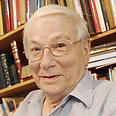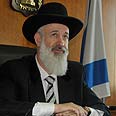

Haredi initiative: Kaddish for Kaniuk
Although he died 'without religion' and asked not to be buried according to Jewish tradition, religious gestures are being made for elevation of renowned novelist's soul. 'We will make sure that Kaddish is said for him; he is a Jew after all,' says Rabbi Metzger
While there were those who criticized him for his hostile attitude and estrangement from his roots, some mentioned that "a Jew is a Jew is a Jew," and religious gestures were made for the elevation of his soul – saying the Kaddish prayer, studying Mishna and reciting Psalms.
One of them, a Jerusalem resident, told the haredi "Scoop Line," that he would make sure someone would "fill in" for Kaniuk's sons in saying Kaddish for the deceased, "Yoram the son of Moshe," for an entire year.
According to the man, such a deed would help the deceased's soul in the afterlife, and is a personal right and duty towards any Jew who has passed away – even if he was heretical, published articles against the principles of religion, and did not leave offspring to do it for him themselves.
'Symbol separating Israeliness from Judaism'
Israel's Chief Rabbi Yona Metzger told Ynet, "Although I feel a lot of pain over his personal decision, and his legal battle, which eventually opened a breach for the registration of Jewish citizens as having no religion, we at the Chief Rabbinate will make sure that someone will say Kaddish for him throughout the first year, because he is a Jew after all."
In such cases, even when a childless man dies, it is customary that yeshiva or kollel students volunteer to say Kaddish, study Mishna and recite Psalms for the elevation of the soul of the deceased – sometimes for a small amount of money.
Rabbi Dr. Benny Lau wrote on his Facebook page about Kaniuk, "For many of us, he is a symbol of the Israeli literature which emerged from the sands of Tel Aviv. In recent years, he also sought to become the symbol separating Israeliness from Judaism."
Lau recalled how he broke into tears 17 years ago while reading a column by Kaniuk in Haaretz newspaper, in which he praised the detachment from the values of Judaism in favor of universal values.
"I cried because I believed this writing came from a bleeding wound in a Jewish soul. I can assume that the wound was the result of frustration and a deep rift between him and many parts of the nation who lost the ability to speak to him."
When Kaniuk asked to light menorah
"And then, half a year ago," Lau added, "I found myself in a Yedioth Books event in honor of the Hanukkah holiday. It is a very rainy night in the Holon book warehouse – and Rabbi Israel Meir Lau and Yoram Kaniuk are invited to light the fourth candle.
"Yoram stands next to Rabbi Lau and says that he has not lit a Hanukkah candle since his childhood. Rabbi Lau is honored, delivers an address, and then as David Strum is about to conclude the ceremony, Yoram Kaniuk suddenly says, 'May I light a candle?'
"Strum asks the small crowd, which is already starting to leave, to stop and honor the occasion. Yoram Kaniuk stands in front of the menorah, and then it turns out that the candles are already lit. Strum issues a halachic ruling: Your intention is enough – it's as if you lit them. And I look at this sight and think: Perhaps we should add another candle for this small miracle?"
Lau said the incident made him think "about the question of the Jew in me and the question of lighting my candle and our partnership in lighting the candles and our potential of lighting candles instead of starting fires.
"It may no longer be written in his identity card, but he was completely Jewish. May his soul rest in peace," Rabbi Benny Lau concluded.















